
As the marriage equality battle over “non-traditional families” rages on, our SXSW correspondent Daniel Villarreal covers a film about another kind of “non-traditional” family, a foursome from the 1960s.
I’m sitting with Amy Grappell at High Ball, a swanky 50s-style bar, grill, and bowling alley near the Alamo theater where her film just screened. Grappell directed Quadrangle, a short documentary about Deanna and Paul, a couple of the 60s era couple who raised a family as part of a foursome. When I ask Grappell about her own family, she smooths her scarlet hair with a slightly trembling hand, smiles and says, “I didn’t know my family situation was unique until I was in college, around my twenties. Though I’m far beyond that age now.” She laughs. Her interest in Deanna and Paul’s foursome and her noticeable nervousness now both make sense. After all, Paul and Deanna are her parents.
Paul, Deanna and another couple went from constantly hanging out together to swapping spouses, and raising their kids all under one roof. Grappell shows her mom and dad, now divorced, discussing the arrangement in split screen. Recounting the past, her father Paul is reticent and sad. Her mother alternates between wonderment at their unique situation, and bitterness over its dissolution.
To establish an emotional distance from the material, Grappell pretended to be Terry Gross, Fresh Air‘s astute cultural interviewer (who’s not a lesbian, by the way). “If I interviewed [my parents] as me, I’d get really upset and into an argument and they wouldn’t talk about it. I decided that my artistic self was really curious and couldn’t be reactive,” Grappell says. “I felt like I was talking to [my mother] as an adult—and that’s really scary, talking to your parent as an adult.”
How about we take this to the next level?
Our newsletter is like a refreshing cocktail (or mocktail) of LGBTQ+ entertainment and pop culture, served up with a side of eye-candy.
Her therapist recommended the “curious interviewer” approach, and for the most part, Grappell uses it to let her parents tell the story in their own words. Near the end of the film, however, she asks her mom about the foursome’s effect on her children. “I don’t know,” Deanna spits out. “You were there… you tell me!” It’s the only time anyone ever addresses the kids’ feelings. And in omitting the kids, omitting the other couple’s voices, and omitting the world of things Paul and Deanna never mention, the pain and confusion still surrounding their experimental family shines through.
Some of Grappell’s neighbors took interest in their “non-traditional” family, but they also experienced discrimination too. Because he was living in a foursome “my father lost his job at the hospital,” she says. “I wasn’t allowed to play with the kids next door. And I thought it was because I was ugly, too fat, too poor, or Jewish; I didn’t realize it was because of my family.” As the battle for American marriage equality rages on, and more of our LGBT brothers and sisters find themselves facing discrimination for living outside of so-called “social norms.” But it’s important to remember how many of our own heterosexual families fell well outside of the norm too.
Deanna, Paul, and the other couple saw themselves as visionaries, experimenting with an alternative family structure, but one neighbor — always the nosy types — told Paul that he was playing with fire. Seeing Paul, Deanna and their child now, all struggling to understand, I wonder whether that neighbor was right, and what, if anything, they learned from experimenting with social conventions.
“There are so many different ideas of Utopia. For some people it’s the 60s or the Soviet Union. It’s just that most don’t work in the end,” Grappell says. “We’re people, flawed people. I don’t know if we can really uphold an ideal, but we have to try. Making work and asking questions is the way that I keep trying.”
RATING: Four out of five Big Love re-runs. A beautiful film with an undercurrent of loss and melancholy. Grappell’s considering expanding it into a full-length feature, which is good because it leaves viewers wanting more.
Quadrangle will show as part of the “New Directors, New Film” series in New York City this month. It will play at the Museum of Modern Art, March 30th at 9pm; and also at the Water Reed Theater at Lincoln Center, March 31st at 6:15pm.




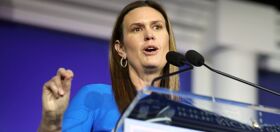

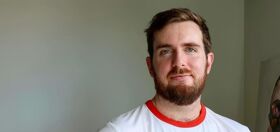
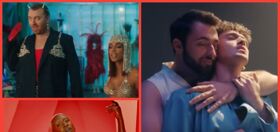
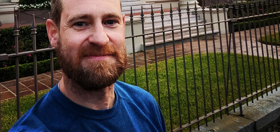

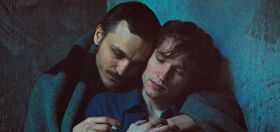

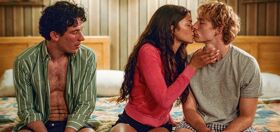
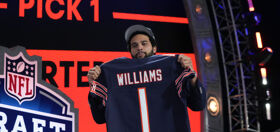
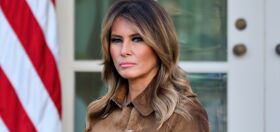



jbran
This is really interesting. I’ve not really personally made up my mind about whether not-monagomy seems doable, but I’m reminded of something I read from a psychologist or something similar. The gist was that, even if we can rationalize sleeping with someone else and still loving our spouse/partner and being committed to them, people rarely give enough weight to the power of jealousy.
AndTom
@jbran:
that is an interesting comment but i wonder if that could work in with guys. i can imagine 3 (if that can really work) but 4 sounds like alot of confusion.
schlukitz
Devil’s advocate that I am, I am dying to know what this foursome think about same-sex marriage and the adoption of children?
persnickety
Jealousy occurs because of a poorly developed sense of self. Emotions are for survival, not compulsion created from egotistic behavior.
Klarth
@AndTom: I believe I read that as well, in Psychology Today, sometime last year.
As for this article, before I read it, I thought it was going to be about a gay and a lesbian couple coming together to raise their children, and the potential usefulness of this family structure to defuse the arguments that not having a parent of each sex around skews child development, as well as compensating for the tendency of lesbian families to be poor with children and gay couples to be childless and better off.
This was interesting, too, though. Basically, the conservative straights don’t like anything beyond the nuclear family, even when it involves straight people. So restrictive.